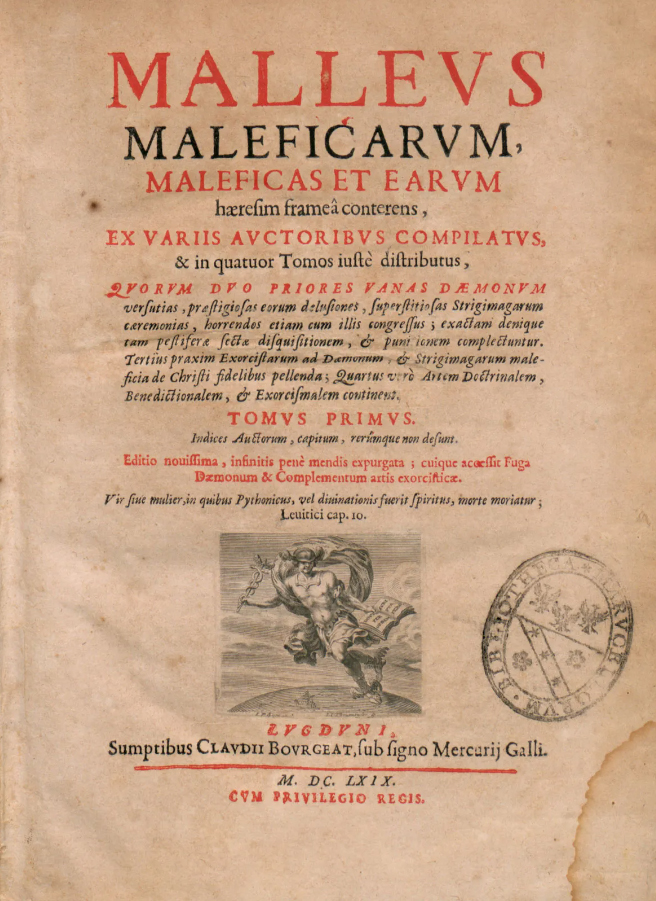
The power of ideas is, well, powerful. Ideas can literally change the world and alter the course of history. With the rise of social media, more and more people are trying to become influencers, some to make money, others to become famous, and yet others just because they want to share their ideas. Being an influencer is nothing new, but the technology available to spread one’s influence quickly and widely is.
Letterpress printing technology and interchangeable type of the 15th century heralded mechanized book production, quickly replacing hand inscribed books on parchment and producing a boom in literacy. Influencers wrote books, some of which became bestsellers. The Age of Enlightenment, sometimes called the Age of Reason, promoted the exchange and dissemination of ideas, not all of which were positive. Just as rumors and conspiracy theories fill the internet today, so too did they fill books of the 16th and 17th centuries.
Among the bestsellers of the time was “Malleus Maleficarum,” or Hammer of Witches, a book about how to identify and punish witches. Popular for two hundred years, the book stimulated a surge of accusations, burnings, and hangings and its influence made its way across the Atlantic to the American colonies.
Among influencers, some achieve greatness; their ideas spread and change cultures. And among great influencers, what we call “thought leaders,” are those who put their ideas into action. Such people are not only thinkers, but doers. The list is considerable and includes religious figures, scientists, and social theorists such as Jesus Christ, The Buddha, Mohammed, Karl Marx, Alexander Graham Bell, Marie Curie, Pasteur, Marconi, Edison, and Steve Jobs, among others. Each brought their truth to the world.
It’s worth asking the question, however, what is truth? Truth is not absolute; it changes and reflects the knowledge and insights of each particular age. Scientific truth, for example, is based on falsity, ie: being able to systematically prove that an assumption is false. Accordingly, scientific truth is always provisional, always awaiting disproval. Nonetheless, humanity acts as if truth will never change.
There is relative safety in thought, but action can be dangerous: the danger of doing without proper consideration of its effects. Take digital technology; the active spread of Artificial Intelligence (AI) is happening at breakneck speed, despite the warnings and caution of many thought leaders. Although the visions of “Terminator” type scenarios may not happen, effects on employment, surveillance, economies, warfare and culture are already transformational. Combined with gene editing tools, non-contained AI could conceivably result in new super pathogens lethal to animal and plant life.
Implementing a great idea is all too human. We are constantly full of ideas, and we manipulate physical reality based upon ideas all day long. In mundane ways like moving dirty dishes from the table to the sink to profound ways in building and launching a space probe to Jupiter, our actions follow the impulses of ideas. In this way we’ve built a human reality that began in imagination but now fills the world. Such is the destiny of “wise humans,” Homo sapiens.
Our wisdom, however, is provisional and often short-sighted. Moreover, unlike the social organization of bees or ants, humanity does not possess a “hive mind” that directs our actions and guides outcomes. Each of us is on our own, able to think and do as we prefer, thus human society is constantly changing.
“Think first, fight afterwards – the soldiers art.”
I always liked this quote.
One approach to thinking is that it a way to test ideas without making changes – it is a kind of abstracted action.
Thanks for the article!
Larry, your wise observations connect events and minds in the most stimulating way- I always come away from reading them with the reassurance that excellent thought is still possible, and the momentary doldrum of news evaporates into its dark cloud. The sun shines on us, after all.